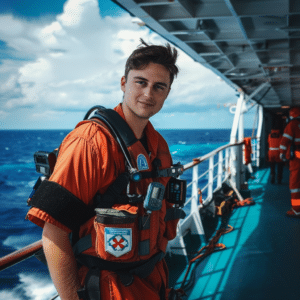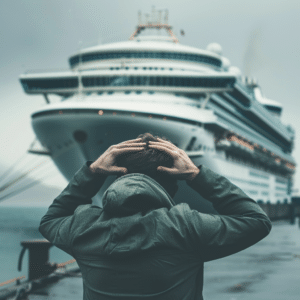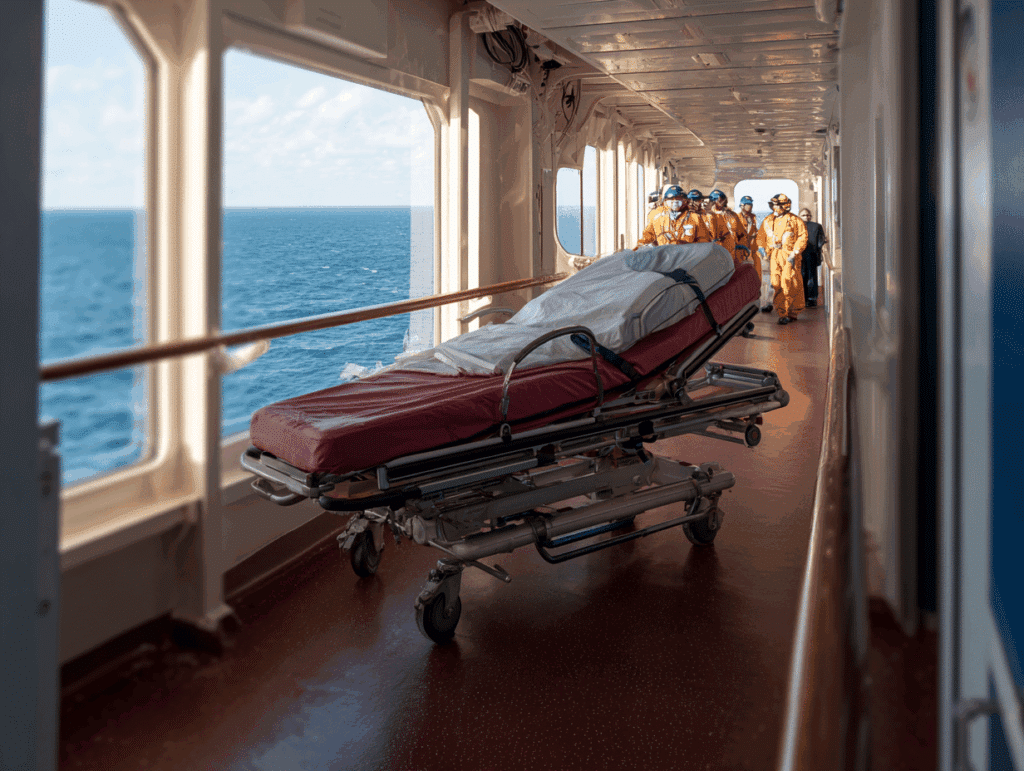Key Takeaways
- Cruise ships have established procedures and facilities for handling deaths at sea, including medical evaluations, discreet communication protocols, and an onboard morgue to preserve the deceased.
- The legal aspects of death on a cruise ship are complex and influenced by factors such as jurisdiction, international maritime law (DOHSA), and the ship’s location, with comprehensive steps for documentation and potential claims of negligence.
- Despite occasional incidents, cruise ships are generally safe with strict safety and health protocols in place, and the incidence rate of deaths onboard is relatively low compared to the overall number of passengers each year.
Let's Go Beyond, to Bring You Back
Let's get you the compensation you're entitled to. Get a FREE Consultation today.
Let's Go Beyond, to Bring You Back
You deserve the compensation you’re entitled to, call for your FREE Case Review today.
Immediate Response to a Death at Sea
If a passenger or crew member passes away on a cruise, immediate actions are taken to maintain responsibility and respect. Medical personnel immediately provide care and attention, evaluating the situation, and if required, pronouncing the death. The ship’s officials are then notified, who in turn inform the port authorities. This not only ensures that legal procedures are initiated but also allows for the safe and dignified handling of the deceased.
In the aftermath of such a tragedy, the emotional toll on the family and fellow passengers cannot be overlooked. The cruise line deploys dedicated care teams to provide emotional and logistical support to those affected, helping them navigate through the difficult time. The body of the deceased is respectfully stored in an onboard morgue until the ship reaches a port where further arrangements can be made.
The Role of Medical Personnel

The medical personnel also play a vital role in the legal procedures that follow a death at sea. They perform the following tasks:
- Conduct a thorough examination of the body
- Inform the port authorities
- Facilitate the issuance of a death certificate (depending on the circumstances and jurisdiction)
- Manage the logistics of disembarking the body
- Address the emotional needs of passengers and loved ones
Notification Protocols
Cruise ships have established notification protocols to manage sensitive situations discreetly. Using code words like ‘PVI’, the crew can communicate about a death or serious medical emergency without causing undue alarm among other passengers. Promptly notifying the family of the deceased is paramount, and if the cause of death is unknown, local authorities conduct an investigation.
Cruise ships are also obligated to report any deaths to the CDC if they occur during a voyage that includes a U.S. port, especially in cases involving infected cruise passengers.
Injured on a Cruise Ship?
Get Compensated For Your Injuries & Damages! Call Us For A FREE Case Review And Know What Your Case Is Worth.
Handling of the Deceased: Cruise Ship Morgue Facilities
Every cruise ship, irrespective of its size, comes with a morgue facility. These are designed to store bodies for up to a week and can usually hold between three to six bodies, depending on the size of the ship. The bodies are wrapped in plastic and placed in body bags, as mandated by federal regulations, ensuring the safe and respectful preservation of the deceased.
The operation of these morgue facilities is entrusted to experienced medical personnel, including physicians and registered nurses who have at least three years of postgraduate experience in general and emergency medicine. They ensure that the body of the deceased is handled with the utmost dignity and care during its time on the ship.
Preservation and Respect
Governed by international standards, cruise ship morgues are designed to respect the dignity of the deceased. They are equipped with body bags and the bodies are stored at freezer temperatures, preserving them for approximately one week.
In addition to these physical measures, cruise lines are sensitive to the religious and cultural beliefs of the deceased. They maintain dignity by:
- Storing the remains in refrigerated morgues until reaching the next port
- Issuing a death certificate
- Transferring the body to a funeral home or repatriating it
Legal Procedures and Death Certification
The complexity of legal procedures following a death at sea often results from jurisdictional challenges. The issuance of a death certificate can be influenced by several factors, including the location of the ship at the time of the death, the nationality of the deceased, and the ship’s registration. Under international maritime law, particularly the Death on the High Seas Act (DOHSA), families can seek legal recourse in the event of a death at sea.
The legal process involves reporting to local authorities, regardless of the ship’s location. A death certificate is then obtained from the port country where the ship docks, and this applies to all cases, from natural deaths to injuries and foul play.
Jurisdictional Challenges at Sea
Jurisdictional issues can significantly impact the legal proceedings following a death at sea. The Death on the High Seas Act (DOHSA) provides legal grounds for surviving relatives to seek compensation for deaths that occur in international waters. There are prescribed legal steps for documenting a death at sea, which include submitting a report to the local US Coast Guard Captain of the Port and, if the deceased was buried at sea, a certified log entry by the Master.
The nationality of the deceased and the ship’s registry can influence which nation’s laws apply. This can impact the filing of lawsuits and determine which country’s laws apply to matters such as compensation and liability.
Disembarking the Departed: Repatriation and Logistics
The process to disembark the deceased begins immediately after a death on a cruise ship. The body is typically stored in the onboard morgue until the ship reaches a port where it can be disembarked. The family of the deceased is usually responsible for the repatriation expenses, some of which may be covered by travel insurance. Embassies play a crucial role in this process, providing paperwork assistance, translation services, and organizing transportation and accommodation for the deceased’s travel companions.
Translation services can be vital, particularly when the death occurs in international waters. They assist with necessary paperwork and provide language assistance during the repatriation process, ensuring that the bereaved family’s wishes are accurately communicated and respected.
Costs and Insurance Considerations

Several factors influence the cost of repatriation from a cruise ship. These include:
- Mode of transportation
- Medical treatment required
- Transportation from the ship to the hospital
- Hospital admission
- Medication costs
- Lodging
- Disability expenses
Additional costs may be incurred if the deceased was buried at sea, including obtaining a permit and any related expenses.
In Case of Negligence: Seeking Legal Recourse
If negligence or foul play is suspected, necessary investigations are initiated to determine the circumstances surrounding the death. The family is notified and, if the cause of death is uncertain, local authorities conduct an investigation. If foul play is suspected, the relevant investigative unit, such as the FBI, is called in to assess the situation and interview all individuals involved.
To establish a claim of negligence, the plaintiff must provide evidence of negligence on the part of the cruise line. This could involve demonstrating the cruise line’s failure to ensure a safe environment or other negligent actions.
The legal process includes the collection of evidence, initiating legal proceedings, and pursuing compensation for damages.
Comparing Risks: How Safe Are Cruise Ships?
Contrary to the occasional tragic incidents that catch media attention, cruise ships are generally considered safe. In fact, cruise ships safe practices are a priority for the industry. Out of the numerous cruises that set sail each year, including other cruise ships, only a small percentage experience accidents aboard cruise ships, which may sometimes result in cruise ship injuries. Even on a single cruise ship, safety measures are implemented, such as:
- Sufficient survival craft
- Firefighting teams
- Smoke detectors
- High railings in open-air areas
- Mandatory safety drills for both guests and crew
However, it’s essential to be aware of potential risks. One such risk is disease outbreaks, such as norovirus and respiratory infections. While cruise companies have extensive experience in managing and containing such incidents, the close quarters and shared facilities on a cruise ship can facilitate the spread of infections.
Disease Outbreaks Aboard Cruise Ships
Disease outbreaks pose a significant risk on cruise ships. To mitigate these risks, cruise ships enforce strict protocols to prevent virus spread and conduct surveillance for gastrointestinal illness outbreaks. The impact of a disease outbreak can be significant, leading to significant disruption and cancellations within the cruise sector.
Despite the potential risks, it’s important to put things in perspective. While disease outbreaks are a concern, they represent a small fraction of the overall cruise experience. The vast majority of cruises pass without incident, offering passengers an enjoyable and safe vacation experience. However, it’s essential to stay informed about more infected cruise passengers and take necessary precautions.
Injured on a Cruise Ship?
Get Compensated For Your Injuries & Damages! Call Us For A FREE Case Review And Know What Your Case Is Worth.
Preparing for the Unforeseen: Tips for Cruise Goers
Preparing for the unexpected is a key aspect when planning a cruise vacation. Acquiring travel insurance offers coverage for unexpected cancellations, medical emergencies, lost or delayed baggage, and emergency medical evacuation services. Being mindful of potential hazards, such as fires, drowning incidents, and elevated fall hazards, can also help ensure a safe and enjoyable cruise experience.
Taking measures to prepare for emergencies is another crucial aspect. This includes:
- Including personal and contact information
- Details of companions
- The ship’s name
- Important medical information in your preparation
It’s also advisable to carry a cruise travel emergency kit with essential items.
To mitigate health risks, the following measures are recommended:
- Frequent handwashing
- Avoiding close contact with sick individuals
- Adhering to the ship’s sanitation protocols
- Seeking medical care if symptoms arise during the voyage.
Cruise Ship Deaths in Perspective
Even though every death is tragic, it’s necessary to view cruise ship deaths in perspective. With an average incidence rate of 200 deaths per year, the likelihood of experiencing a fatality on a cruise ship is approximately 1 in 6.25 million. Over the years, there have been 623 reported deaths on cruise ships, with 89% of the deaths being passengers and 11% being crew members.
The primary factors contributing to mortality rates on cruise ships are:
- Natural causes
- Accidents
- Murders
- Suicides
- Overdoses
While it’s important to be aware of these risks, it’s equally important to remember that the vast majority of cruises in the global cruise industry pass without incident, offering cruise passengers an enjoyable and safe vacation experience.
Frequently Asked Questions
What happens if a person dies on a cruise?
If a person dies on a cruise, their remains will be kept in the ship’s morgue until the next port where the body can be unloaded and transferred to local authorities.
Are there jails on cruise ships?
Yes, there are jails on cruise ships, known as briggs, which are used for short-term containment and managed by ship security officers to ensure the safety of passengers and crew.
Are there morgues on cruise ships?
Yes, most cruise ships are required to have a morgue on board in case of emergencies, and the body is kept there until it can be disembarked at the next port or the port of origin.
What happens to your body if you fall off a cruise ship?
If you fall off a cruise ship, the sudden cold shock response can make you gasp involuntarily and swallow seawater, putting you at risk of drowning. Stay aware of your surroundings to avoid this situation.
What is the leading cause of death on cruise ships?
The leading cause of death on cruise ships is overboard incidents, such as falling, jumping, or being thrown, which account for 23 percent of all deaths.


